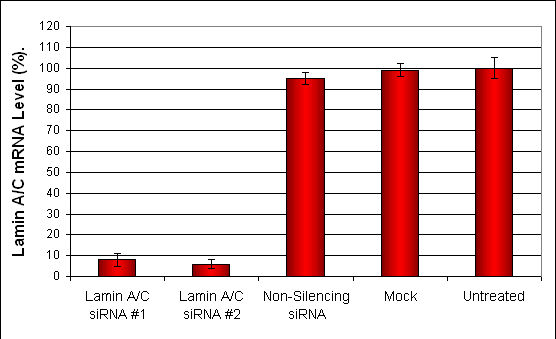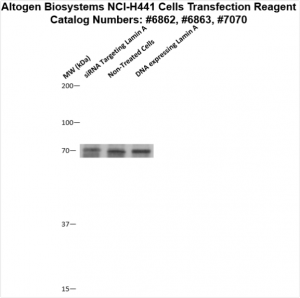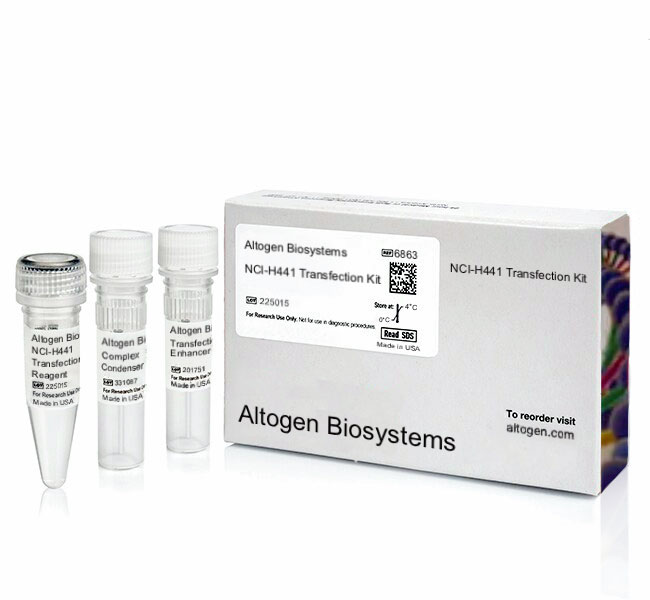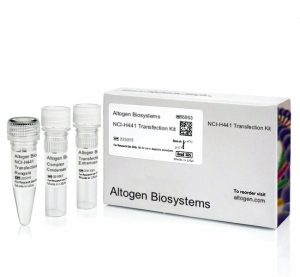Description
Purchase Orders: Click “Add to Cart” button to order, then email PO to orders@altogen.com.
Product Availability: In Stock.
Transfection Reagent for NCI-H441 Cells (Lung Adenocarcinoma Cells, HTB-174)
- A biodegradable polymer based transfection reagent
- Once inside the cell, the polymer degrades into smaller less toxic components reducing cell toxicity, facilitating release of the transgene
-
Optimized for cellular delivery of pDNA, siRNA, microRNA, and mRNA
-
High transfection efficiency of both siRNA and plasmid DNA without compromising cell viability
-
Achieve robust siRNA uptake for dependable gene silencing
-
Effective transfection under conditions of up to 40% serum
-
Transfection kit includes Transfection Enhancer reagent
-
Gentle enough to be used for single cell analysis
-
Download in vitro NCI-H441 transfection protocol: [PDF]
- Download NCI-H441 CRISPR/Cas9 transfection protocol: [PDF]
-
Download PowerPoint presentation for NCI-H441 cells transfection kit: [PPT]
-
Developed and manufactured by Altogen Biosystems
Transfection Efficiency:
Reagent exhibits at least 92% transfection efficiency of siRNA delivery. Transfection efficiency was determined by qRT-PCR.
Product Description:
Advanced formulation of H441 cell line transfection reagent and optimized transfection protocols provide efficient intracellular delivery of proteins, DNA, mRNA, shRNA, siRNA, and other negatively charged biomolecules.
Transfection Protocol and SDS:
Download Altogen Biosystems NCIH441 Transfection Protocol: [PDF]
Download SDS: [PDF]
NCI-H441 Cell Line:
NCI-H441 is a human non-small cell lung cancer cell line that was originally derived from a patient with lung adenocarcinoma. NCI-H441 cells are characterized by their high expression of mucin proteins, which are involved in the production of mucus in the lungs. These cells also have a mutation in the TP53 gene, which encodes for the p53 tumor suppressor protein, and a deletion in the CDKN2A gene, which encodes for the p16 tumor suppressor protein. Researchers have used NCI-H441 cells to study various aspects of lung cancer biology, including the signaling pathways that drive tumor growth and metastasis, the mechanisms of drug resistance, and the development of new therapeutic agents. This cell line has also been used to study the role of mucin proteins, p53, and p16 in cancer development and to test the efficacy of novel drugs targeting these pathways.
According to a 2014 article in Molecular Pharmaceutics, pharmaceutical inhalation research is limited due to the lack of extensively studied and well characterized in vitro models of human distal lung epithelial phenotype. However, research shows that NCl-H441 cells can potentially serve as a robust model system of human distal lung epithelium. The NCI-H441 cell line was initially established in 1982 by A.F. Gazdar, M. Brower, and D. Carney and associates. The cells were derived from the pericardial fluid from a male patient with papillary adenocarcinoma and can be cloned in soft agar. NCI-H441 cells exhibit an epithelial cellular morphology and express major surfactant apoprotein (SP-A). Also, they have shown to be able to express pulmonary surfactant protein (SP-B). The NCI- H441 cell line has been known to have a doubling time of approximately 58 hours. NCI-H441 cell line is considered an excellent host for a variety of biomedical applications as well as for lung cancer research. Altogen Biosystems offers polymer-based biodegradable transfection reagent kits for the NCI-H441 cell line.
NCI-H441 cell line mutations:
| U2AF1 | 7307 | 37 | 21 | 44524456 | 44524456 | Missense_Mutation | SNP | G | A |
| STEAP1B | 256227 | 37 | 7 | 22532267 | 22532267 | Silent | SNP | G | A |
| OR13G1 | 441933 | 37 | 1 | 247836182 | 247836182 | Silent | SNP | C | T |
| RYR2 | 6262 | 37 | 1 | 237798272 | 237798272 | Missense_Mutation | SNP | C | G |
| GPR139 | 124274 | 37 | 16 | 20043222 | 20043222 | Silent | SNP | C | T |
| COL14A1 | 7373 | 37 | 8 | 121279119 | 121279119 | Missense_Mutation | SNP | G | A |
| GJB4 | 127534 | 37 | 1 | 35227279 | 35227279 | Missense_Mutation | SNP | G | A |
| GRIK3 | 2899 | 37 | 1 | 37291324 | 37291324 | Missense_Mutation | SNP | C | T |
| PLCG2 | 5336 | 37 | 16 | 81960739 | 81960739 | Missense_Mutation | SNP | G | T |
| HOXB1 | 3211 | 37 | 17 | 46607032 | 46607032 | Silent | SNP | G | C |
| GZMA | 3001 | 37 | 5 | 54398532 | 54398532 | Silent | SNP | C | T |
| PRR16 | 51334 | 37 | 5 | 120022371 | 120022371 | Silent | SNP | G | A |
Data:

Figure 1. siRNAs targeting Lamin A/C mRNA or non-silencing control siRNA were transfected into NCI-H441 cells following the recommended protocol. At 48 hours post-transfection the cells were analyzed by RT-PCR for Lamin A/C gene expression levels. 18S rRNA levels were used to normalize the Lamin A/C data. Values are normalized to untreated sample. Data are means ± SD (n=4).

Figure 2. Protein expression of Lamin A in NCI-H441 cells. DNA plasmid expressing Lamin A or siRNA targeting Lamin A were transfected into NCI-H441 cells following Altogen Biosystems transfection protocol. At 72 hours post-transfection the cells were analyzed by Western Blot for protein expression levels (normalized by total protein, 10 µg of total protein loaded per each well). Untreated cells used as a negative control.
Altogen Biosystems provides optimized transfection kits and electroporation products for life science research. Transfection products are developed for individual cancer cell line and transfection protocols are optimized to enable high transfection efficiency of molecules. Altogen Biosystems developed in vivo delivery products for small animal research, mouse and rat targeted tissue delivery: liver targeted, pancreas targeted, kidney targeted, PEG-Liposome-, Nanoparticle-, Lipid-, and Polymer-based in vivo transfection kits. Advanced formulation of reagents and optimized transfection protocols provide efficient cellular delivery of biomolecules. Read more about transfection technology at Altogen’s Transfection Resource. Altogen Labs provides GLP compliant contract research studies for preclinical research, IND applications, and drug development. Biology CRO services include: Xenograft models (90+), development of stable cell lines, ELISA assay development, cell-based and tissue targeted RNAi studies, safety pharm/tox assays, and other studies (visit AltogenLabs.com).
Volume Options:
- 0.5 ml (Catalog #6862)
- 1.5 ml (Catalog #6863)
- 1.5 ml CRISPR (Catalog #2181)
- 8.0 ml (Catalog #7070)
Purchase Orders: Click “Add to Cart” button to order, then email PO to orders@altogen.com.
Product Availability: In Stock.






